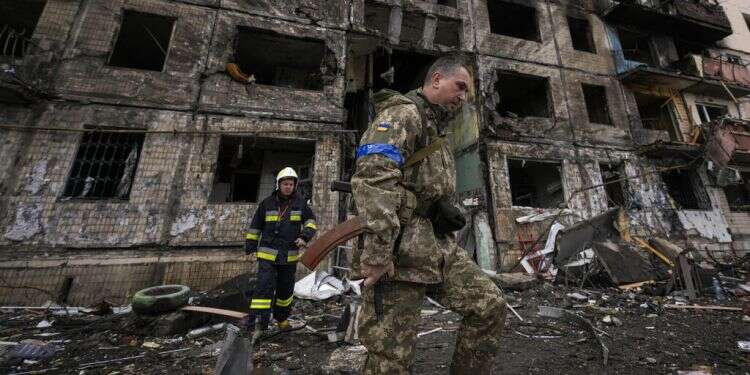Russia shelled more than 40 towns in Ukraine's eastern Donbas region, destroying nearly a dozen high-rise buildings, authorities said on Thursday, as Moscow's forces sought to surround their Ukrainian foes, outnumbering them in some places.
Follow Israel Hayom on Facebook, Twitter, and Instagram
After failing to seize Ukraine's capital Kyiv or its second city Kharkiv in its three-month-old war, Russia is trying to wrest full control of the Donbas on behalf of separatists. The industrial region comprises the Luhansk and Donetsk provinces.
Russia has poured thousands of troops into the region, attacking from three sides in an attempt to encircle Ukrainian forces holding out in the city of Sievierodonetsk and its twin, Lysychansk. Their fall would leave the whole of Luhansk province under Russian control, a main Kremlin war aim.
"Everything now is focused on the Donbas," Ukrainian Interior Ministry adviser Vadym Denisenko told a briefing.
He said the situation was very tense as 25 Russian battalion tactical groups attempted to surround the Ukrainian forces.
The Joint Task Force of Ukraine's armed forces said the Russians had shelled more than 40 towns in the region, destroying or damaging 47 civilian sites, including 38 homes and a school.
"As a result of this shelling five civilians died and 12 were wounded," it said on Facebook, adding that 10 Russian attacks had been repelled, four of its tanks and four drones destroyed, and 62 "enemy soldiers" killed.
Ukrainian President Volodymyr Zelenskyy's office said 11 high-rise buildings were destroyed in Sievierodonetsk and eight in Lysychansk.
Zelenskyy has said Russian troops heavily outnumber Ukrainian forces in some parts of the east and Kyiv has been trying unsuccessfully to arrange a prisoner swap with Moscow.
The number of Ukrainian prisoners of war held in the Russian-backed self-proclaimed Luhansk and Donetsk People's Republics number is increasing daily, Luhansk official Rodion Miroshnik was quoted by the TASS news agency as saying.
"There are a lot of prisoners," Miroshnik said. "Now the total number is somewhere in the region of 8,000. That's a lot, and literally, hundreds are being added every day."
As Russia seeks to solidify its grip on the territory it has seized, its President Vladimir Putin signed a decree simplifying the process for residents of newly captured districts to acquire Russian citizenship and passports.
The Russian parliament scrapped the upper age limit for contractual service in the military on Wednesday, highlighting the need to replace lost troops.
In a late-night video address, Zelenskyy, commenting on the new Russian enlistment rules, said the Russians "no longer have enough young men, but they still have the will to fight. It will still take time to crush this will."
Zelenskyy said this week the conflict could only be ended with direct talks between him and Putin.
Russia has blockaded ships from southern Ukraine that would normally export grain and sunflower oil through the Black Sea, pushing up prices globally. Russia and Ukraine account for nearly a third of global wheat supplies and the lack of exports from Ukraine is contributing to a growing global food crisis. The African Union urged the two countries on Wednesday to unblock exports of grains and fertilizer to avoid widespread famine.
Ankara is in negotiations with Moscow and Kyiv to open a corridor via Turkey for grain exports from Ukraine, a senior Turkish official said on Thursday.
"Turkey is negotiating with both Russia and Ukraine for the export of grains from Ukraine," the official said, requesting anonymity.
"With a corridor to be opened from Turkey, there was a demand for this grain to reach their targeted markets. Negotiations are still ongoing," the person added.
Russian Deputy Foreign Minister Andrei Rudenko was quoted as saying on Wednesday that Moscow was ready to provide a corridor for vessels carrying food in return for the lifting of some Western sanctions. Turkey neighbors Ukraine and Russia on the Black Sea.
Russia has blamed severe Western sanctions for the food crisis. It said on Wednesday it was ready to provide a humanitarian corridor for vessels carrying food but wanted sanctions to be lifted in return.
The economic pressure mounted on Wednesday when the United States did not extend Russia's license to pay bondholders, pushing it closer to the brink of a historic debt default.
The waiver has allowed Russia to keep up government debt payments until now.
The European Commission has proposed making the breaking of its sanctions on Russia a crime. The EU also said it hoped to agree on sanctions on Russian oil before the next meeting of EU leaders.
Russia, for now at least, is not short of money. Oil and gas revenues stood at $28 billion in April alone thanks to high energy prices.
The Russian Finance Ministry said it would pay dollar-denominated foreign debt in rubles in rubles and offer "the opportunity for subsequent conversion into the original currency," in a move foreign countries will likely see as a default.
The ministry didn't give a timeframe for the move.
Russia has not defaulted on its international debts since the 1917 Bolshevik Revolution when the Russian Empire collapsed and the Soviet Union was created. Russia defaulted on its domestic debts in the late 1990s during the Asian financial crisis but was able to recover from that default with the help of international aid.
"The current situation has nothing whatsoever in common with the situation in 1998 when Russia did not have enough means to cover its debts," Russian Finance Minister Anton Siluanov said in a statement.
"Now there is money and there is also the readiness to pay. This situation, artificially created by an unfriendly country, will not have any effect on Russians' quality of life," Siluanov said.
Subscribe to Israel Hayom's daily newsletter and never miss our top stories!




